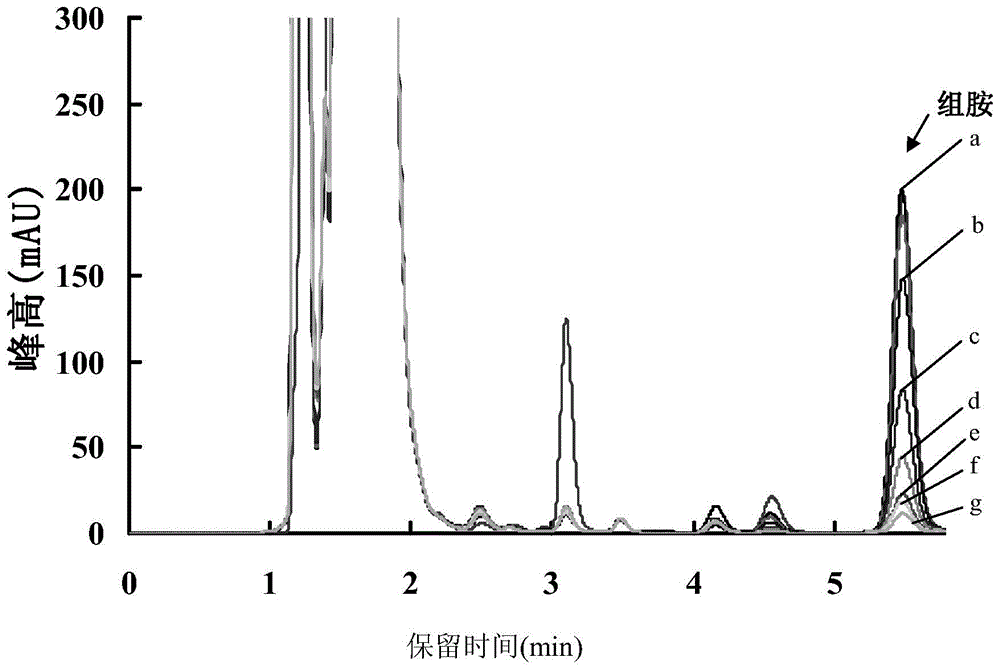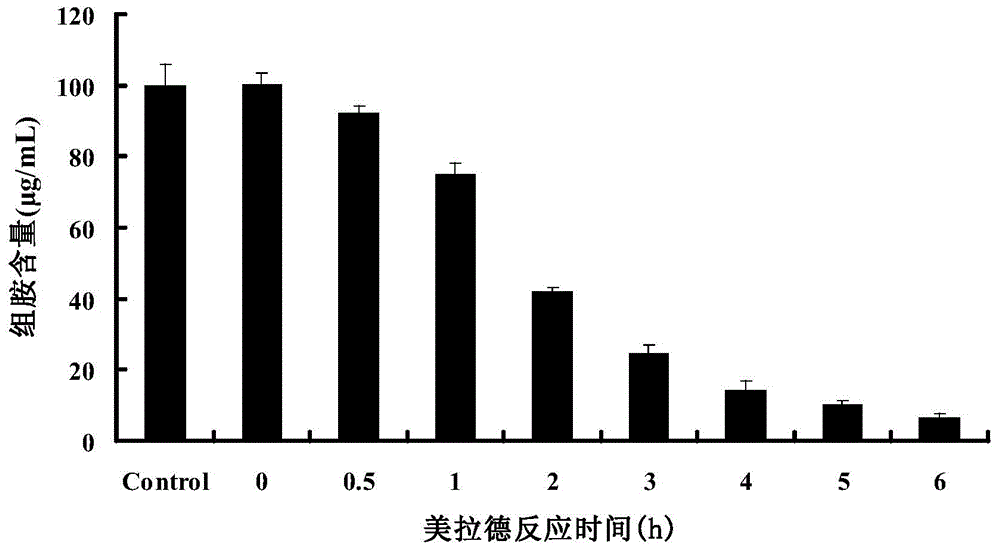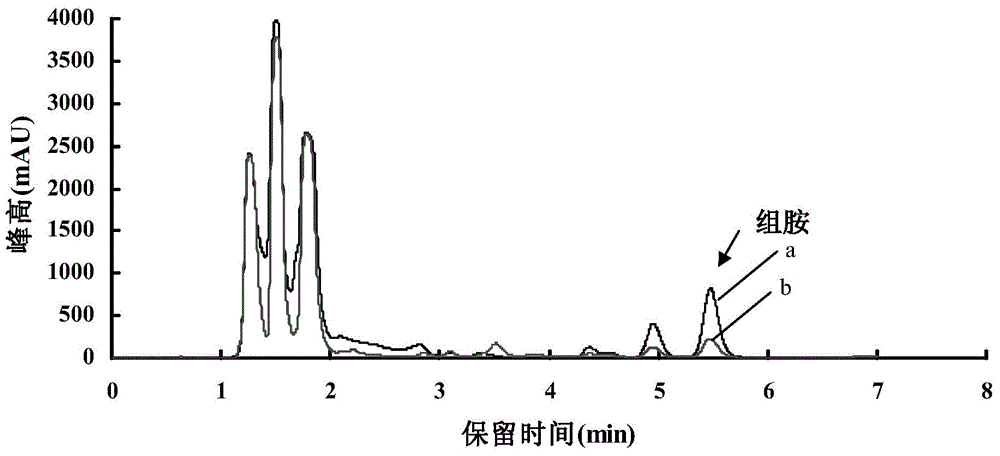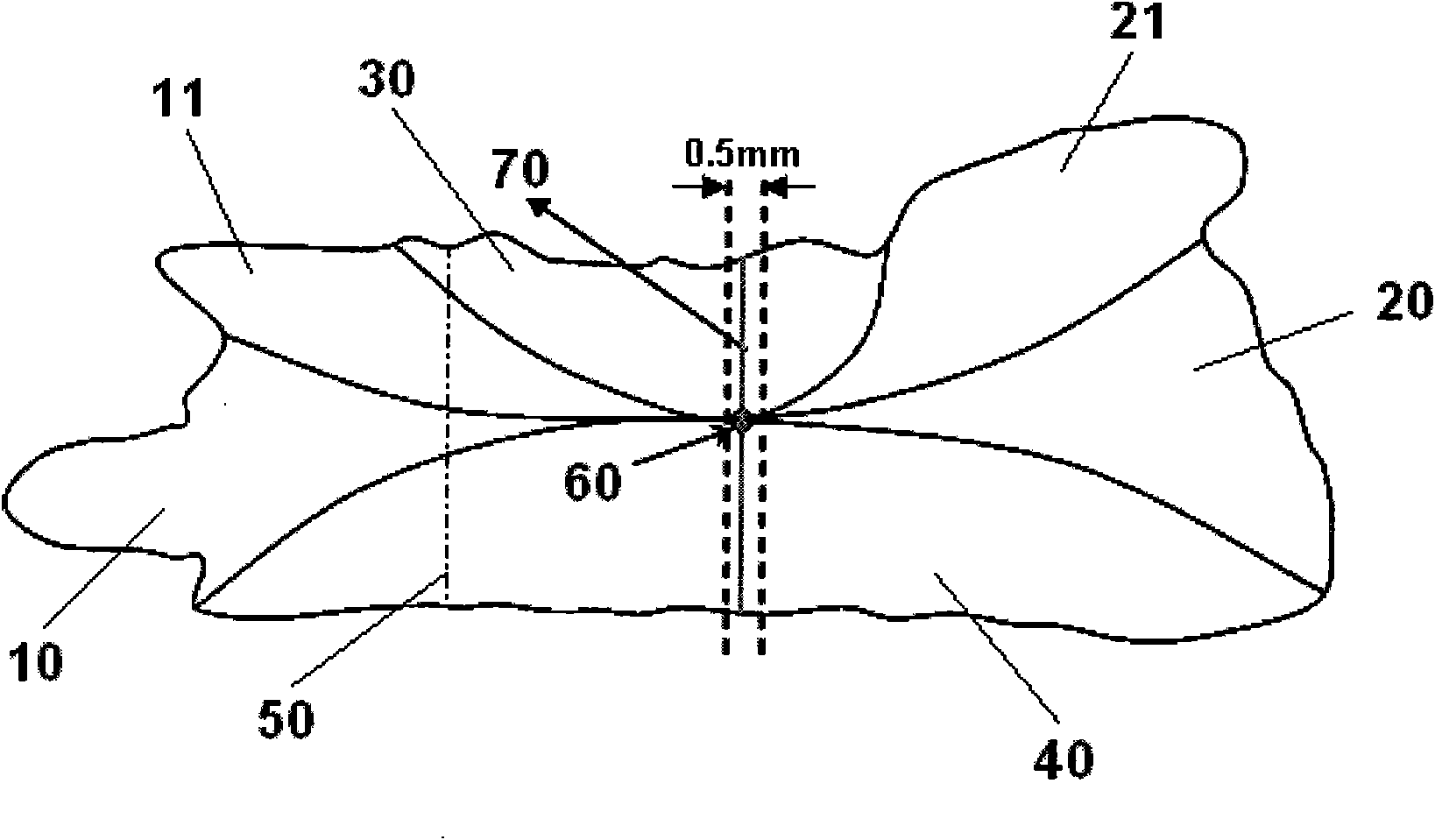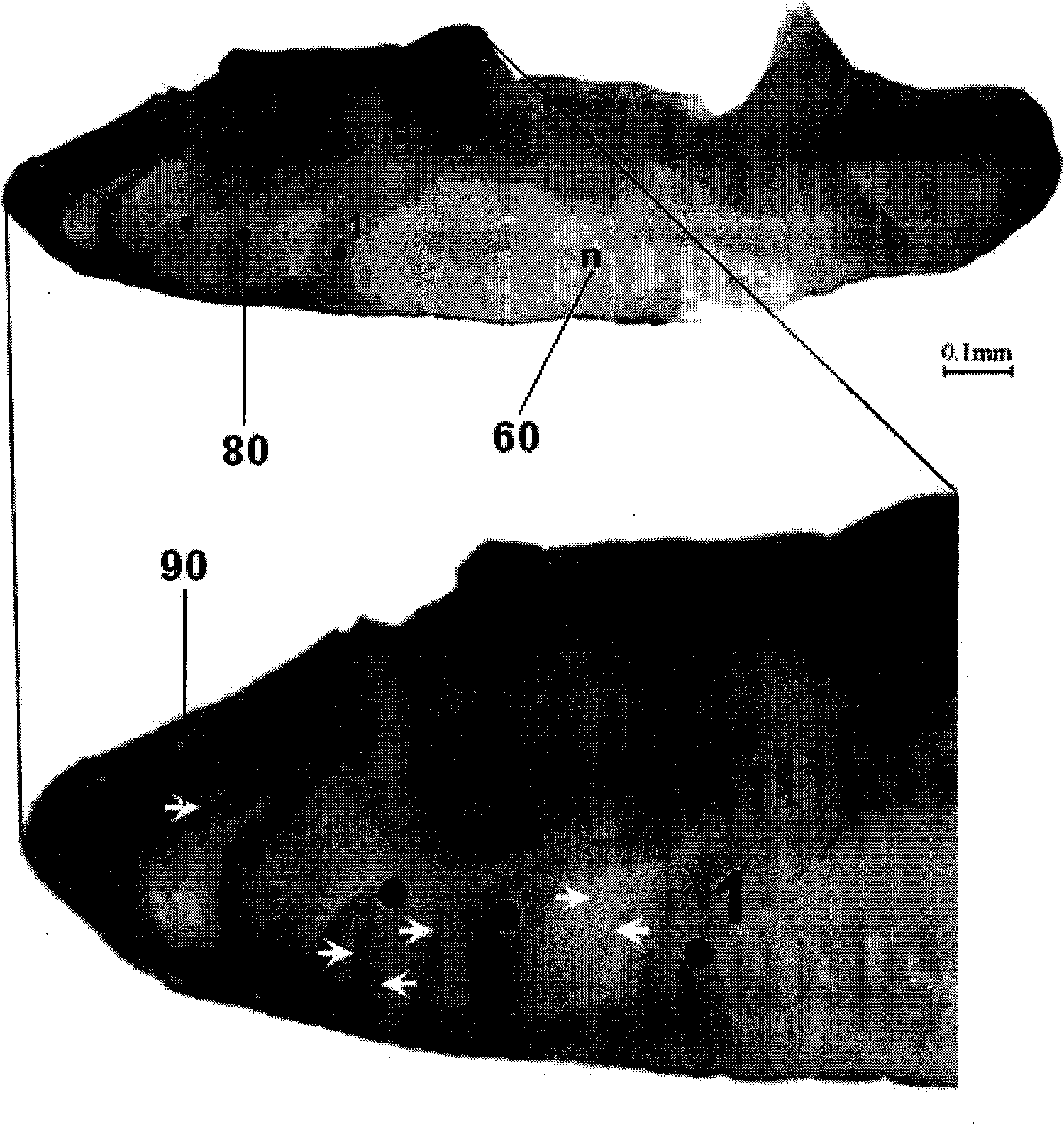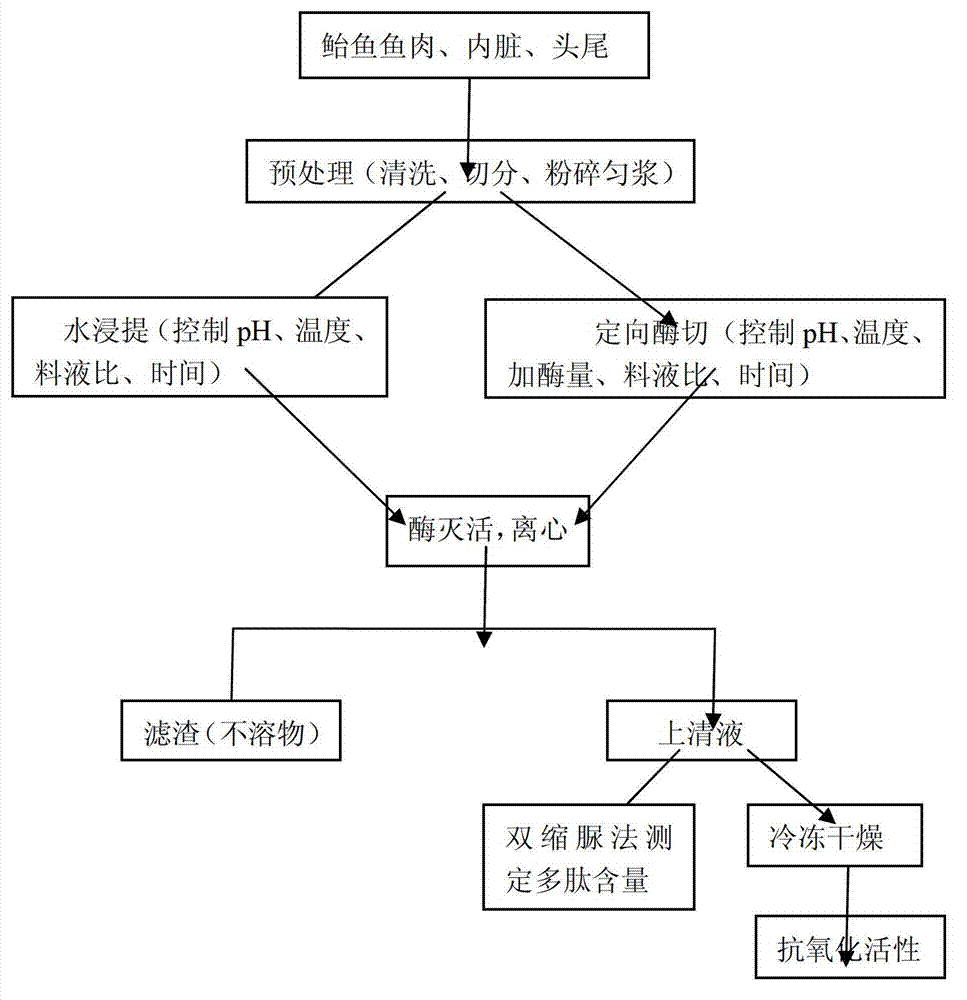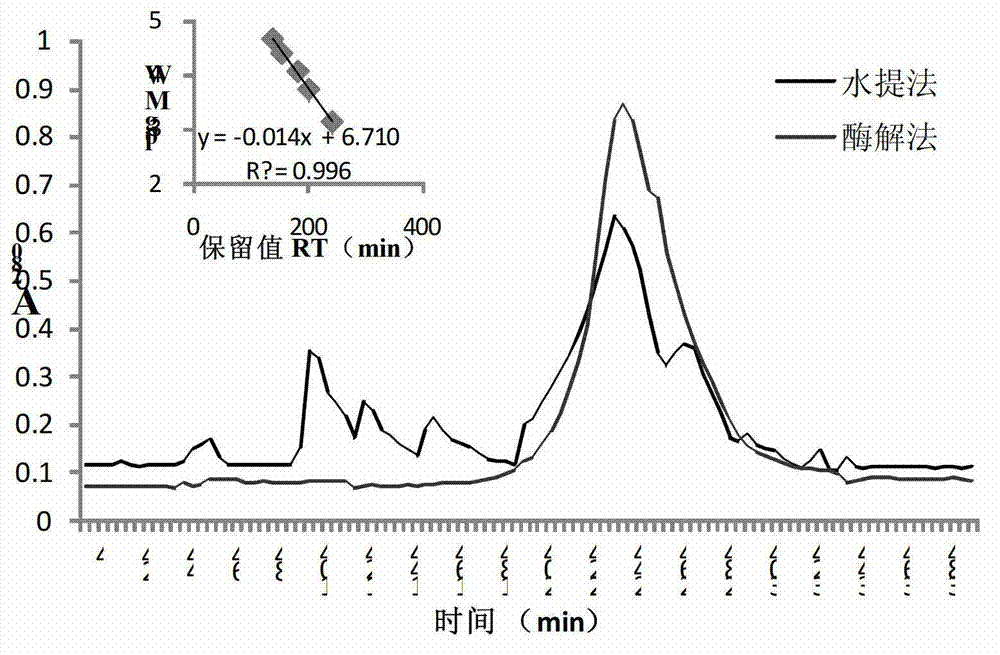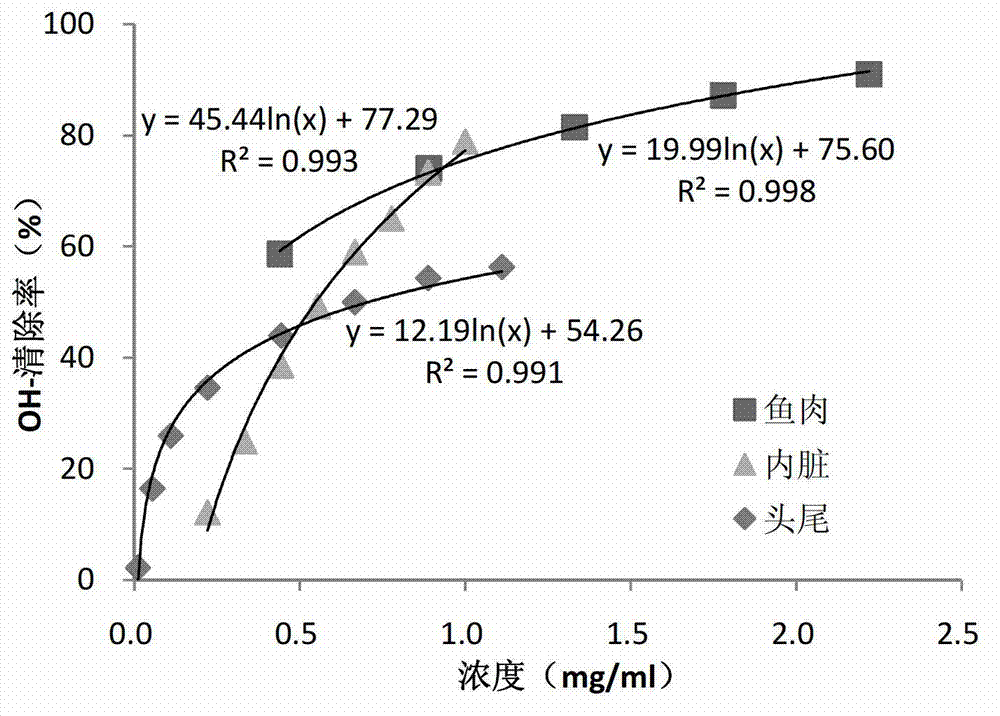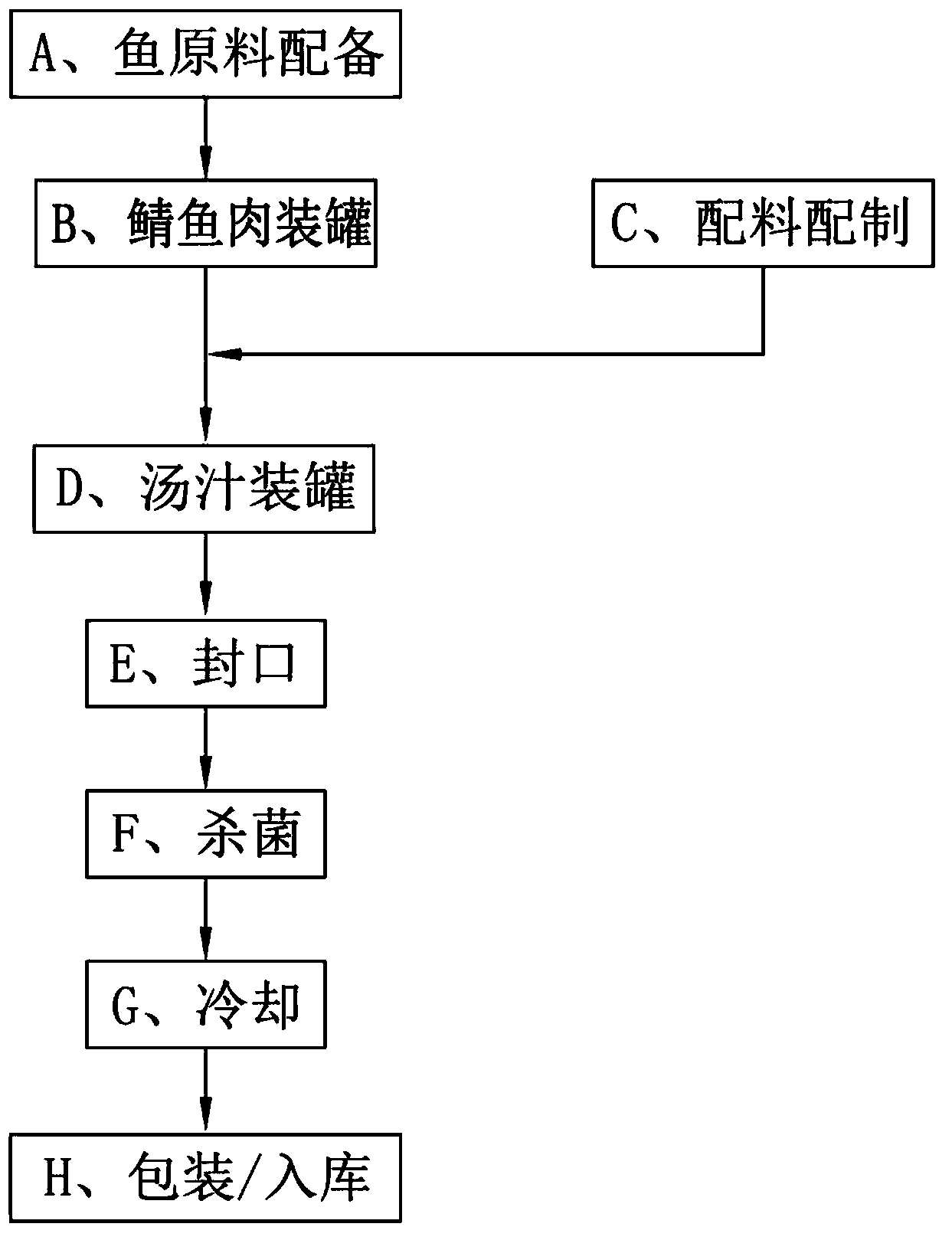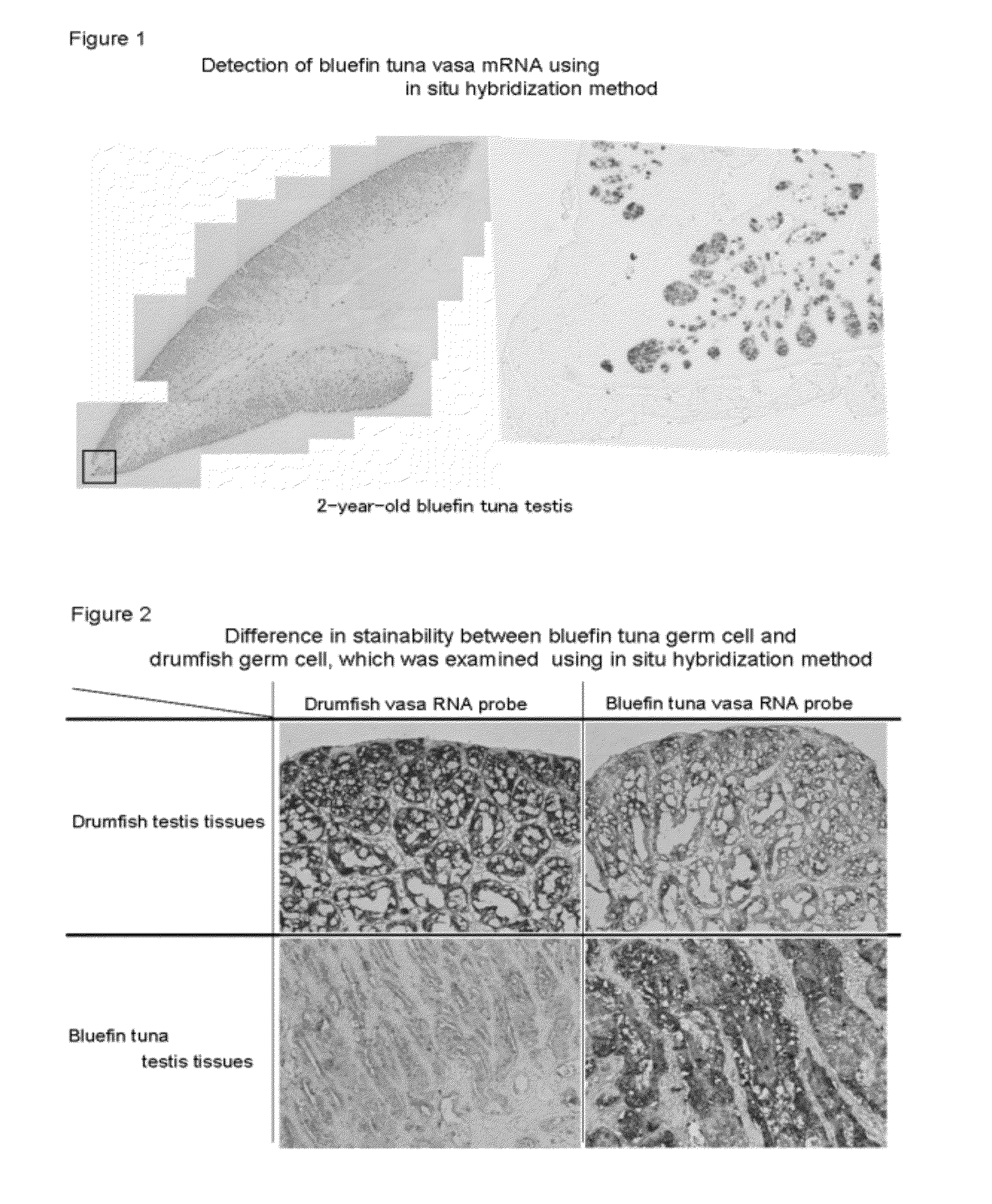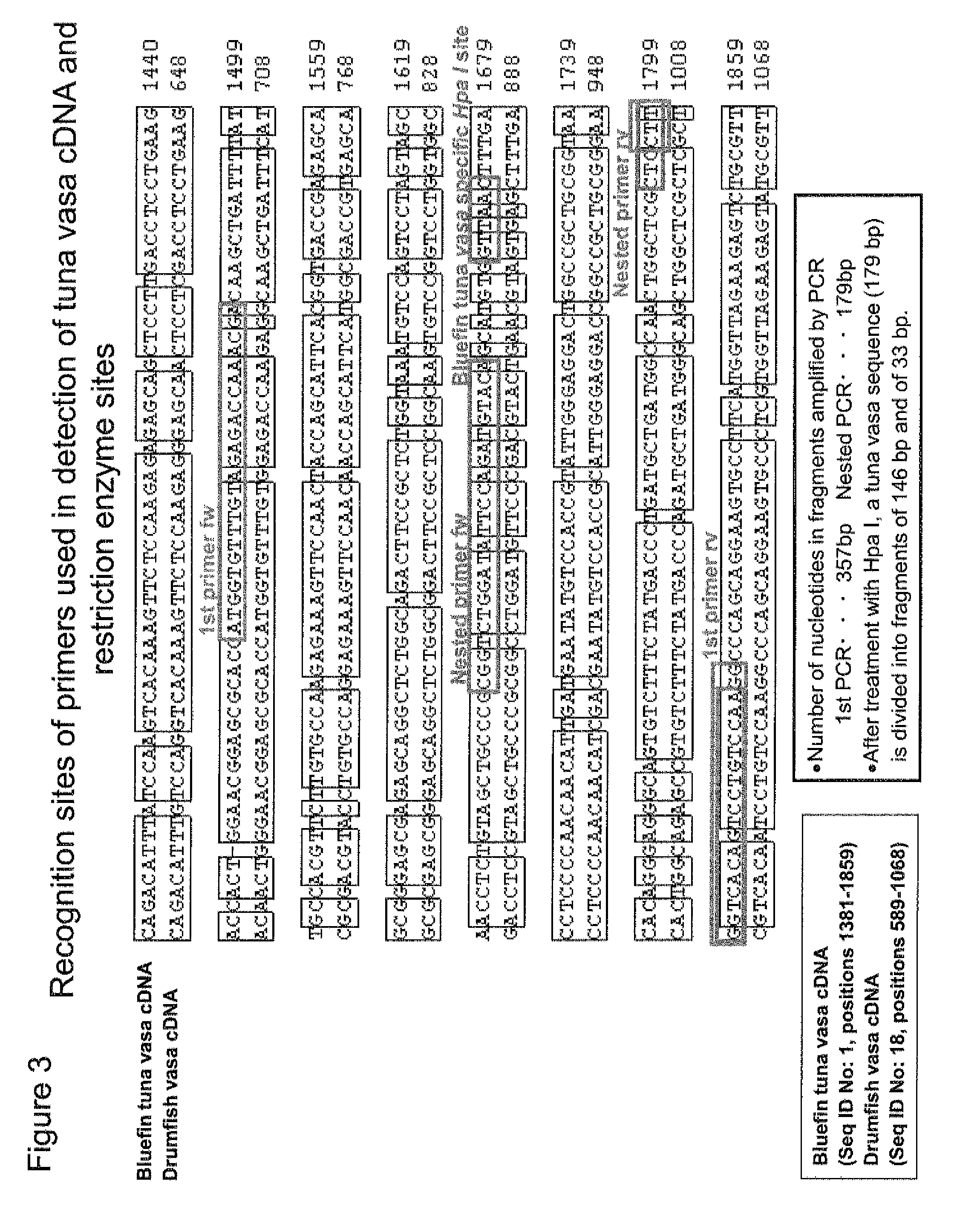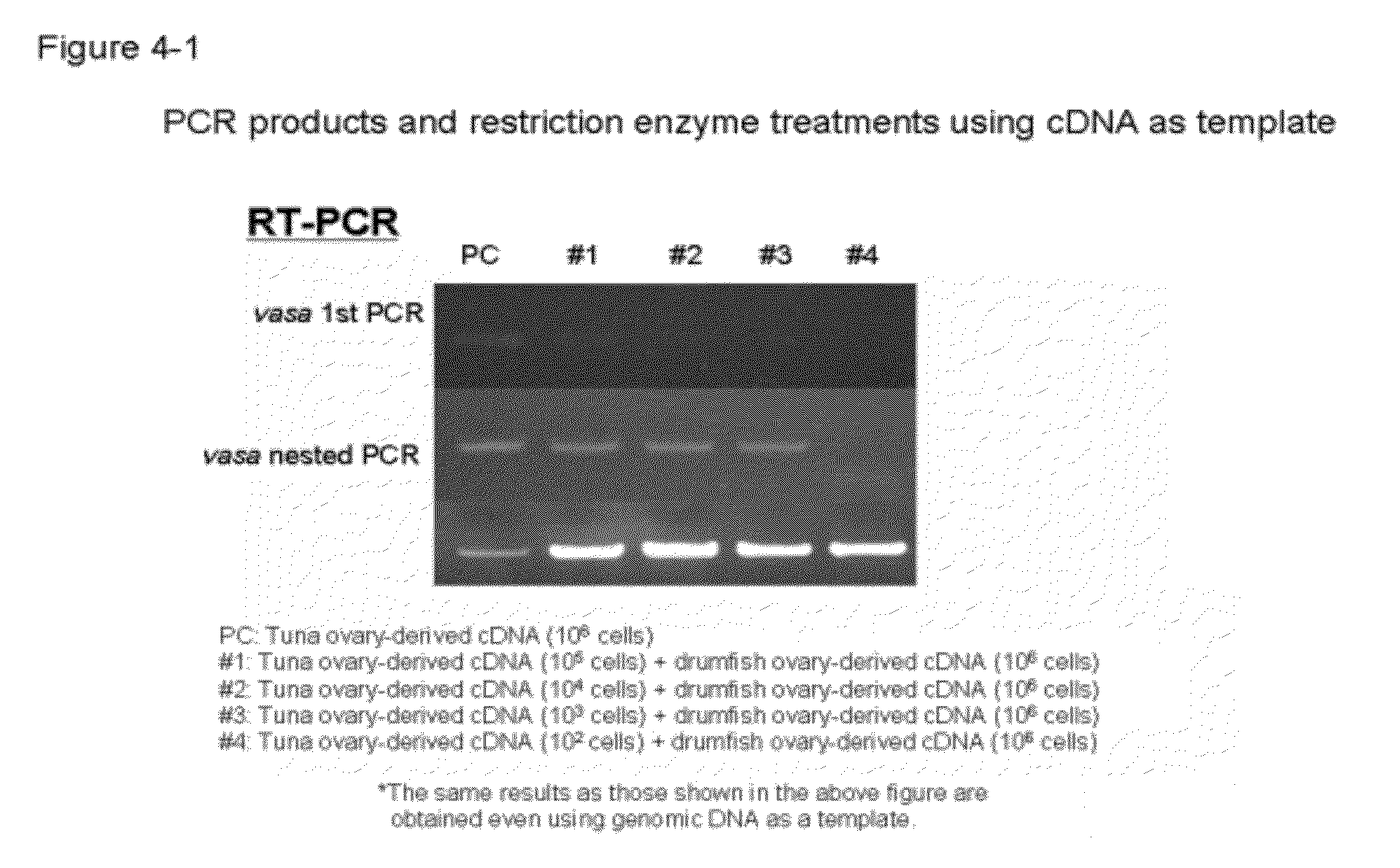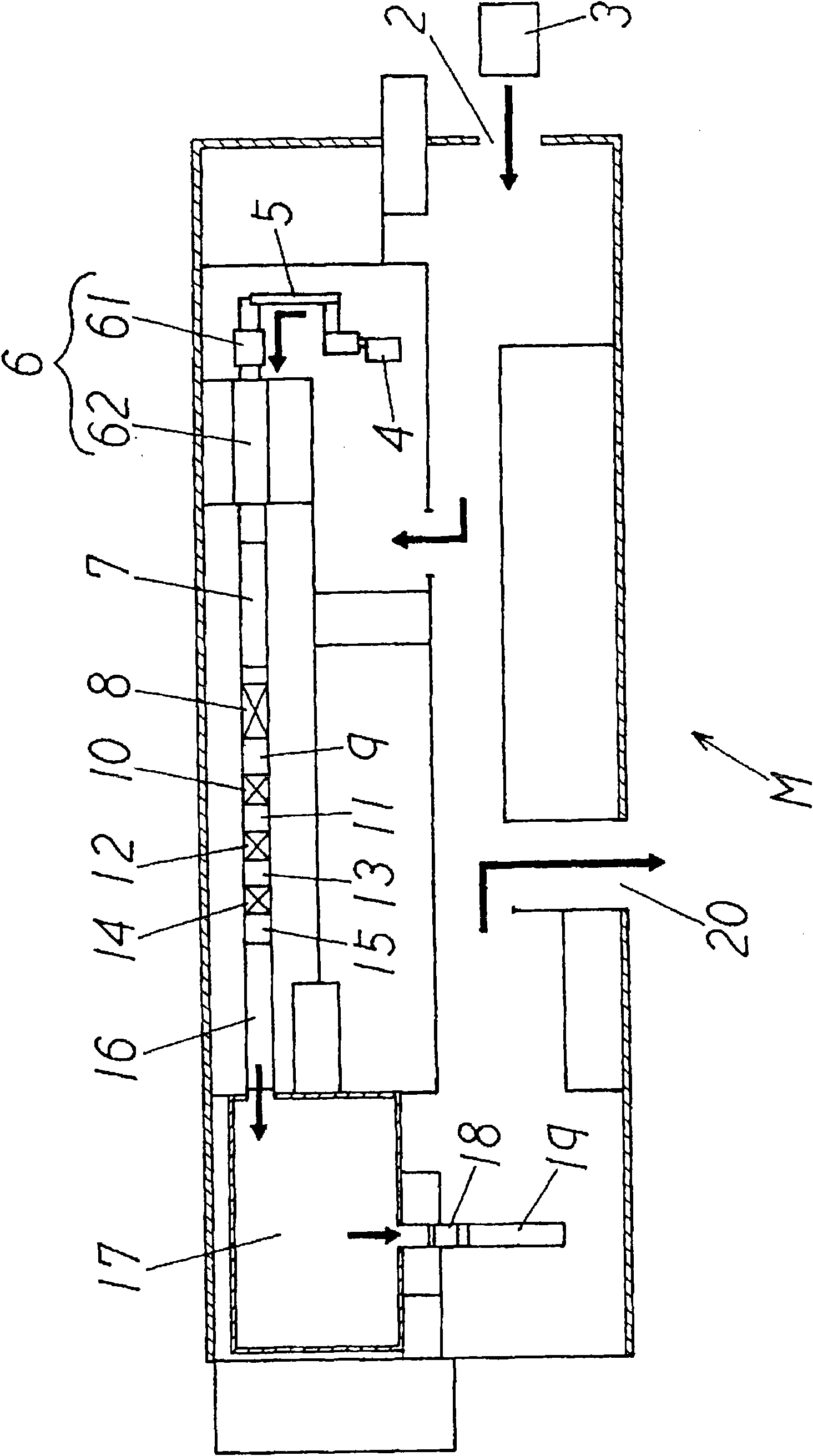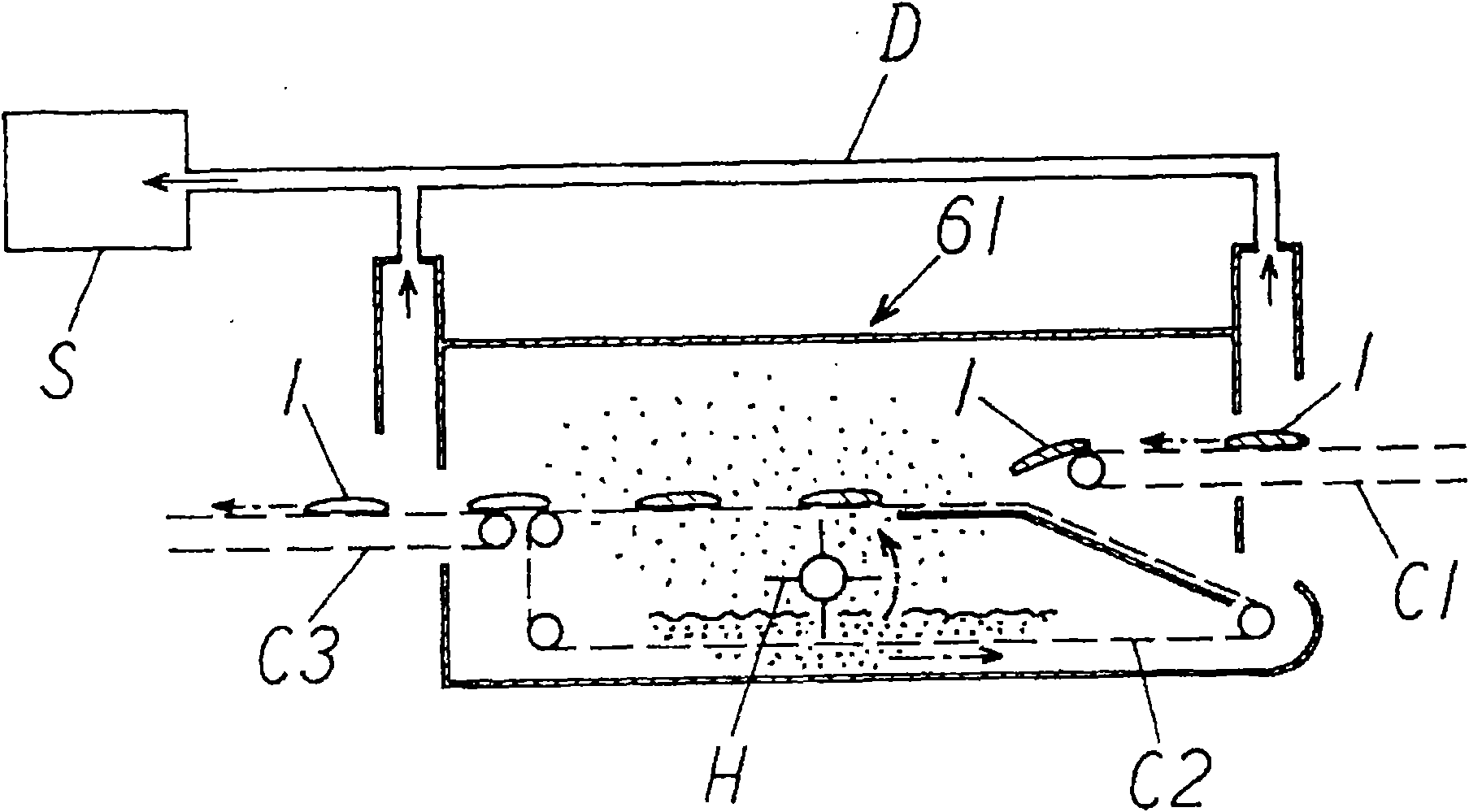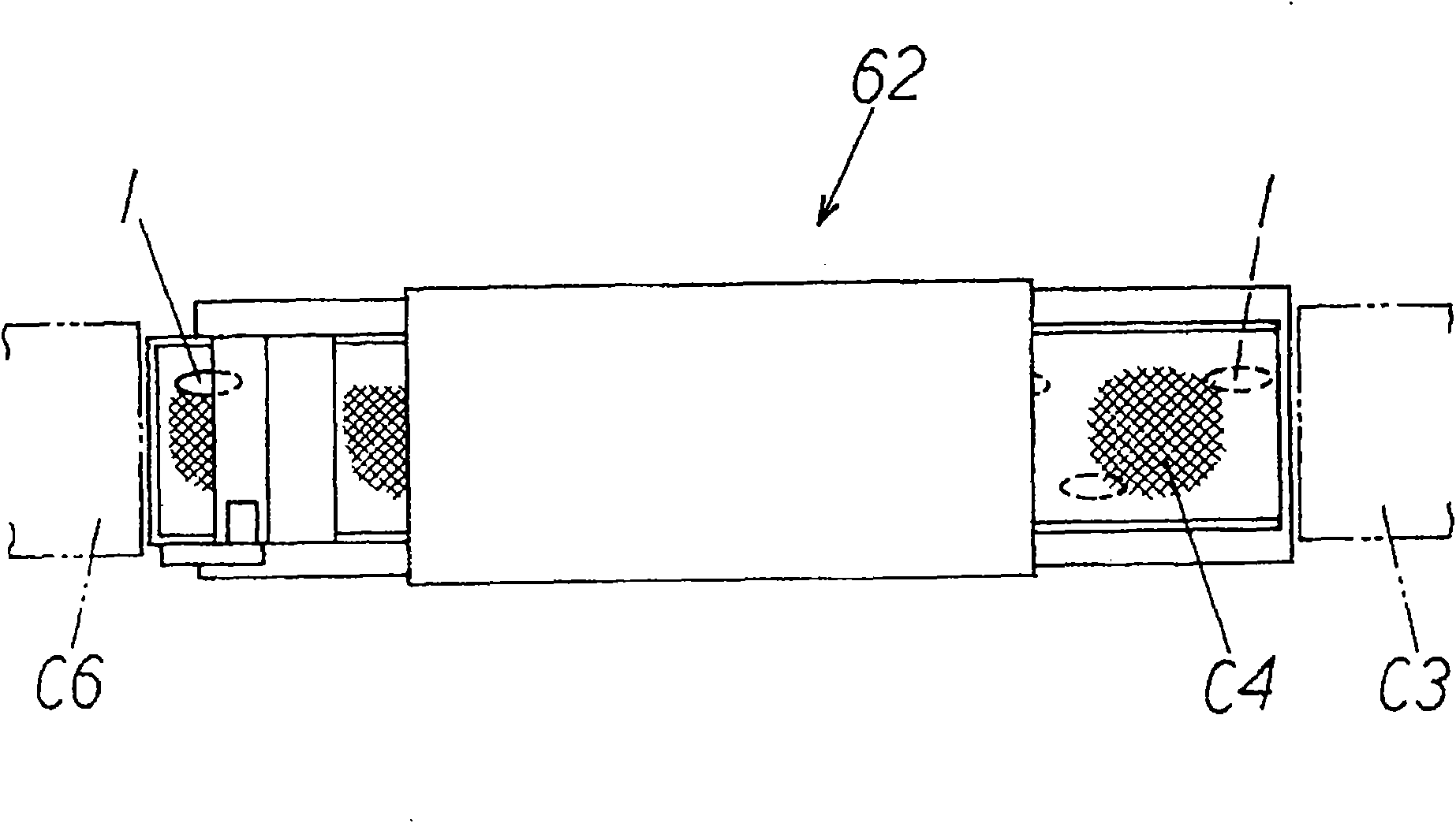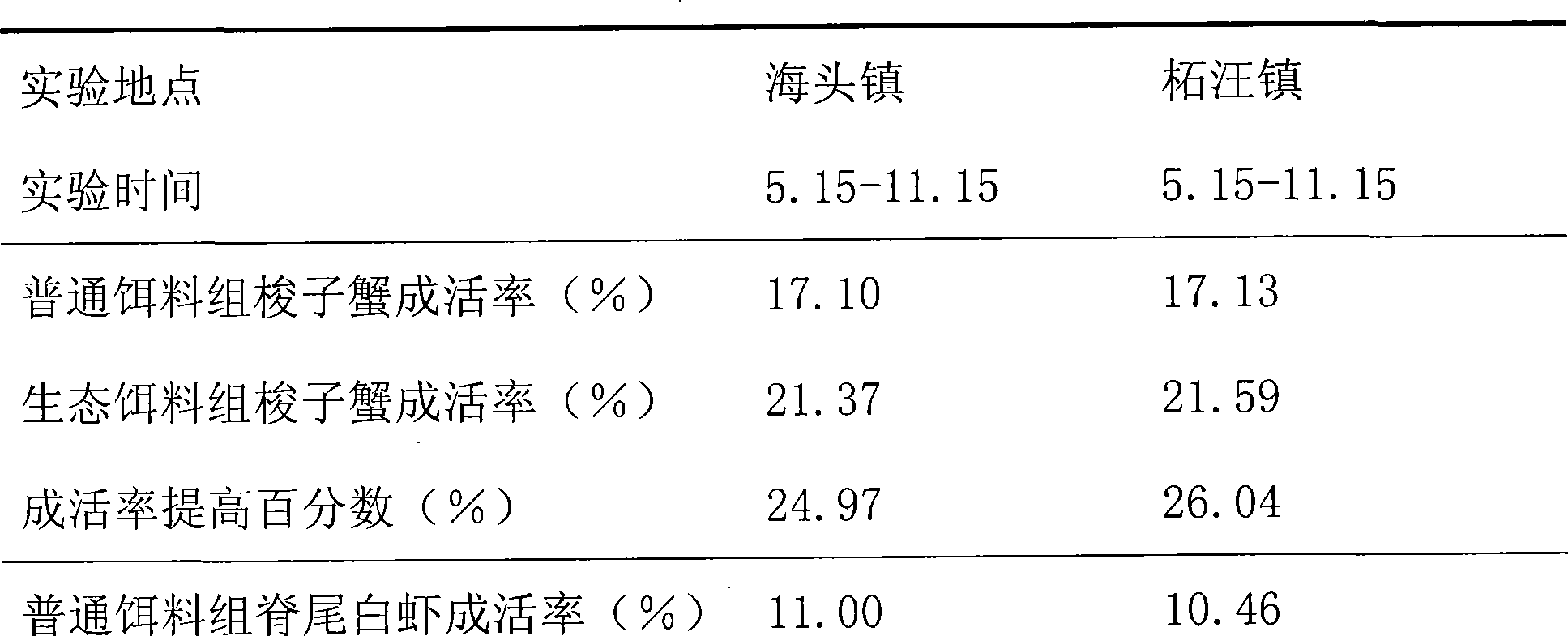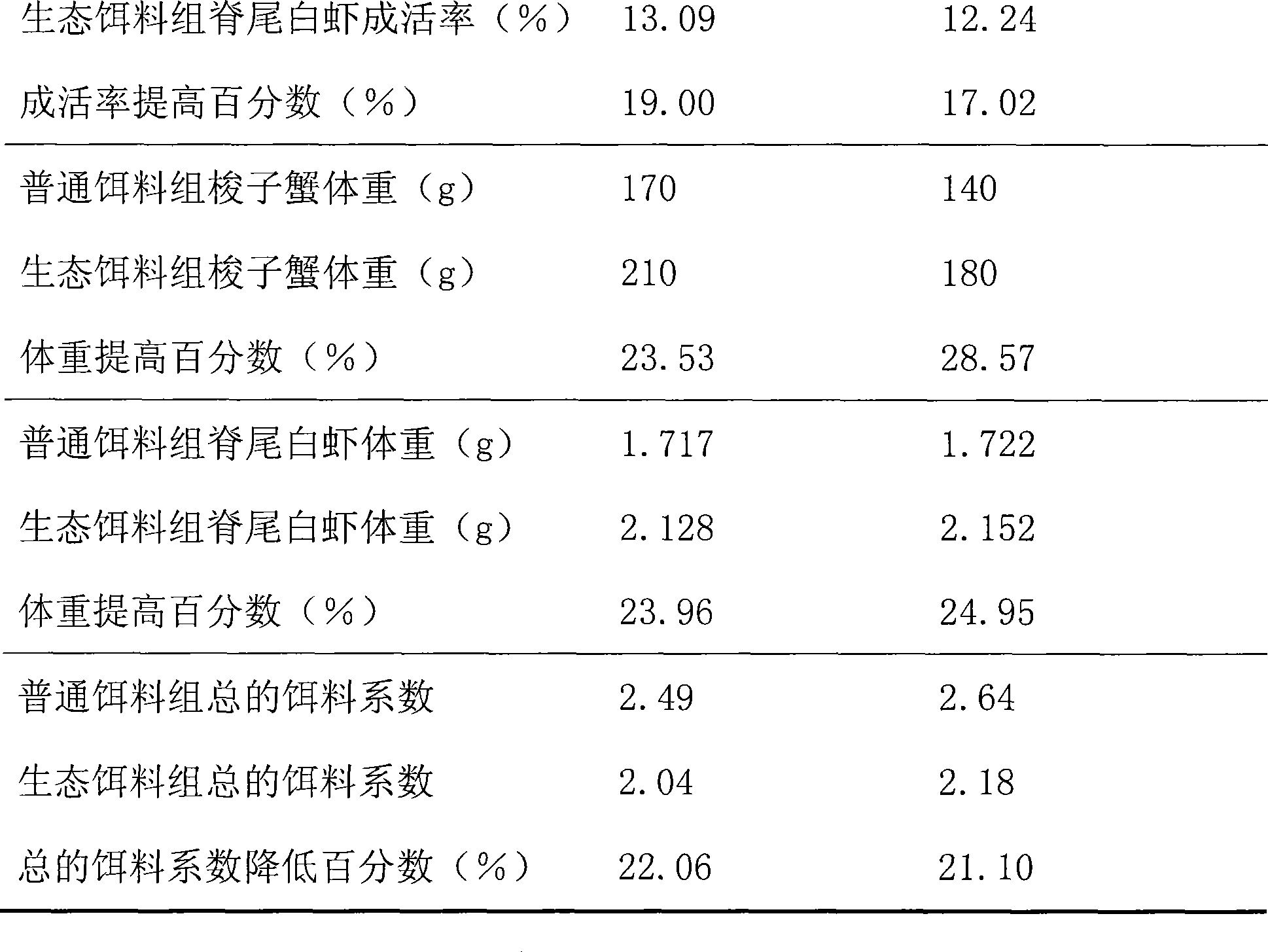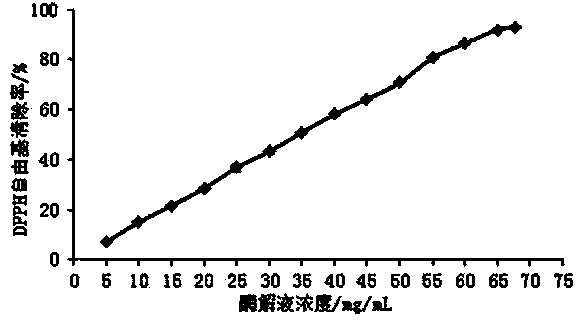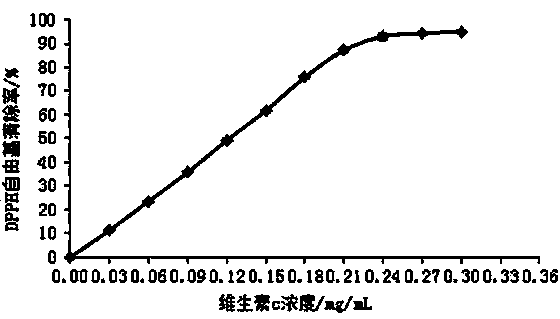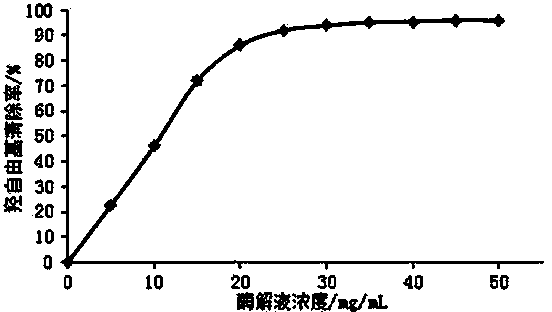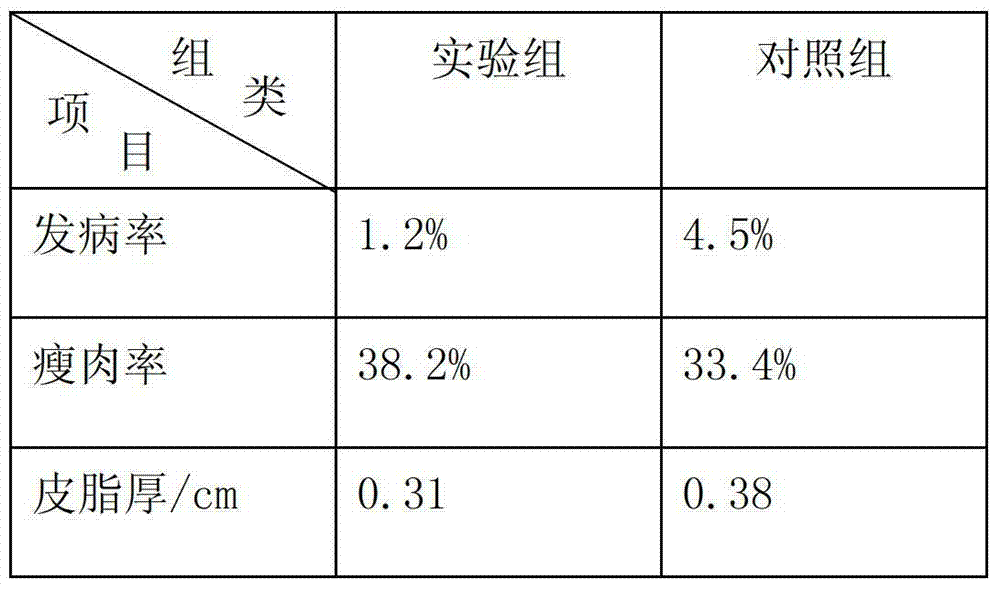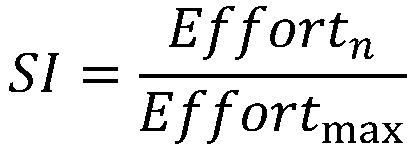Patents
Literature
145 results about "Mackerel" patented technology
Efficacy Topic
Property
Owner
Technical Advancement
Application Domain
Technology Topic
Technology Field Word
Patent Country/Region
Patent Type
Patent Status
Application Year
Inventor
Mackerel is a common name applied to a number of different species of pelagic fish, mostly from the family Scombridae. They are found in both temperate and tropical seas, mostly living along the coast or offshore in the oceanic environment.
Processing method of canned tunas
InactiveCN101779695AGreat tasteImprove antioxidant capacityMeat/fish preservationClimate change adaptationMonosodium glutamateVitamin C
The invention discloses a processing method of canned tunas. Compared with the generally processed canned tunas, the invention has the advantages that cheap tunas such as frigate mackerels and the like are used as raw materials, and aiming at the inherent defects of sour taste, dark color, easy browning and the like of frigate mackerel tunas, the invention provides two solutions correspondingly in the processing method, wherein one solution is color protection treatment, namely a brine soaking method is used for removing partial blood water and soluble protein in tuna bodies by adding citric acid and vitamin C into brine to perform the function of color protection; and the other solution is to add the soup of the invention into the canned tuna meat after the raw materials are processed and cooked to perform the functions of preventing the tuna meat from being oxidized, preventing the tuna meat from browning and improving the taste of the tuna meat, wherein the soup comprises salt, monosodium glutamate, sodium pyrophosphate, sodium tripolyphosphate, citric acid and vitamin C. The invention overcomes the inherent defects of cheap tunas, can be used for processing the cheap tunas used as can raw materials into the canned tunas, and improves the economic benefit and the development prospect of the products.
Owner:H&P FOODS
Processing method for reducing histamine in canned mackerel
ActiveCN103598488AMaintain textureMaintain nutritional contentMulti-step food processesFood preparationAbdominal cavityRoom temperature
Relating to a processing method for canned mackerel, the invention specifically provides a processing method for reducing histamine in canned mackerel. The processing method for reducing histamine in canned mackerel is characterized by simple and reasonable process, strong operability, and easy realization of large scale production. The method includes: using clear water to perform spray thawing on frozen mackerel; removing the head, the tail and the viscera from the thawed fish, cleaning bloodstains, black films and dirt in gills inside the abdominal cavity by clear water; cutting the fish body into fish blocks, washing them, and removing the remaining bloodstains; putting the fish blocks into salt sugar water to undergo soaking; canning the soaked fish blocks, then performing boiling in boiling water; cooling the boiled can to room temperature and draining water in the can; adding boiled salt sugar water into the cooled can, and keeping the headspace height at 0.8-1.0cm; adding a can cover, then conducting heat exhaust, and carrying out sealing while hot; employing high temperature and high pressure steam to conduct sterilization; performing cooling after sterilization; and wiping the moisture on the can surface, and carrying out casing and warehousing.
Owner:JIMEI UNIV
Instant mackerel minced fillet product with smoke taste, and preparation method thereof
InactiveCN104522739AHigh gel strengthImprove water holding capacityFood preparationGlutaminaseTrypsin inhibitor
The invention discloses an instant mackerel minced fillet product with smoke taste, and a preparation method thereof. According to the preparation method, mackerel minced fillet is subjected to unfreezing, mixing and kneading without seasonings, mixing and kneading with salt, and mixing and kneading with seasonings, wherein transglutaminase, soybean trypsin inhibitor, a smoke solution, modified starch, and seasonings are added in the step of mixing and kneading with seasonings; an obtained mixture is subjected to low-temperature and high-temperature two-stage heat seating, cooling, and packaging; and the finished products are obtained via electron beam cold sterilization. One portion of mackerel minced fillet comprises, by mass, 0.2 to 0.4% of transglutaminase, 0.2 to 0.3% of the smoke solution, 0.08 to 0.012% of soybean trypsin inhibitor, and 10 to 12% of modified starch. Advantages are that: gel strength and water holding capacity of the minced fillet product are improved; oxidation resistance, and antiseptic and preservation effects are excellent; and the instant mackerel minced fillet product is convenient for eating, is excellent in taste, and is high in nutritional value.
Owner:NINGBO UNIV
Production method for shredded mackerel
ActiveCN103054079AOvercome the shortcomings of insufficient deep processingTake advantage ofFood preparationNutritionProcess engineering
The invention relates to the technical field of food science and aims at providing a production method for shredded mackerel. The production method comprises the following steps of pre-treating materials, deburring, removing peels, degreasing, removing fishy smell, carrying out antioxidant treatment, seasoning, cooking, squeezing, roasting and rubbing, and packaging. According to the production method disclosed by the invention, the operation is simple and the processing cost is low. The mackerel in the production process is not easy to deteriorate, and the prepared shredded mackerel is rich in various nutrient substances needed by a human body, full of nutriments, free from fishy smell, convenient to eat, delicious, good in mouthfeel, quick to digest and absorb, and capable of satisfying the requirements of different crowds. Moreover, the shredded mackerel is soft, not easy to harden and long in quality guarantee period.
Owner:ZHEJIANG MARINE DEV RES INST
Method used for increasing gel strength of mackerel minced fillet
ActiveCN104522740AImprove water holding capacityStrong resistance to frost denaturationFood ingredientsFood preparationSucroseTrypsin inhibitor
The invention discloses a method used for increasing gel strength of mackerel minced fillet. The method comprises following steps: mackerel is subjected to washing, flesh collecting, rising, dehydrating, and fine filtering; a composite antifreeze agent prepared via mixing of cane sugar, sorbitol, polyphosphate, a mackerel flesh enzymolysis product, and soybean trypsin inhibitor, is added with blending; and frozen mackerel minced fillet is obtained via packaging and quick freezing; wherein 1.6 to 2.4g of cane sugar, 1.6 to 2.4g of sorbitol, 0.08 to 0.12g of polyphosphate, 2 to 3g of the mackerel flesh enzymolysis product, and 0.01g of soybean trypsin inhibitor are added into 100g of mackerel minced fillet. Advantages of the method are that: degradation and salt-soluble protein content decreasing of fish protein are slowed down, and mackerel minced fillet water holding capacity and gel quality are improved.
Owner:NINGBO UNIV
Production method for dietary fiber health-care fish sausage
The invention relates to a production method for dietary fiber health-care fish sausage, comprising the following steps: common Japanese mackerel or spanish mackerel or yellow croaker is selected as raw material; after fish scales, heads, tails and internal organs are removed, the fish bodies are cleaned, fish is fetched and then is chopped and mixed, and 20g-30g of salt, 0.05g-0.15g of sodium nitrite and 1.5g-2.5g of complex phosphate are added in every 1kg of fish in order to pickle the fish; then 1.5g-2.5g of gourmet powder, 5g-10g of yellow wine, 0.2g-0.3g of sodium erythorbate, 1g-2g of pepper, 0.2g-0.4g of garlic powder, 0.6g-0.8g of shallot powder, 0.2g-0.4g of ginger powder, 3g-5g of meat essence, 4g-6g of carrageenan, 30g-40g of isomalto oligosacharide or / and fructo-oligosaccharide, 10g-20g of soybean protein, 34g-40g of starch and 40g-60g of soybean dietary fiber as accessories are added into every 1kg of fish; then the fish is filled, shaped, packaged and sterilized after low-temperature kneading, thus, the fish sausage is produced. The fish sausage is rich in nutrition, fresh, fragrant and delicious and has the functions of relieving constipation and loosening bowel, reducing blood pressure, regulating blood sugar level, preventing and curing diabetes, preventing obesity, reducing weight and the like. The invention has advanced process, reasonable working procedure and feasible operation and is suitable for industrialized production.
Owner:SHANDONG HOMEY AQUATIC DEV +1
Preparation method of crop organic fertilizer
ActiveCN103880482AImprove autoimmunityMaintain or restore robust growthAnimal corpse fertilisersClimate change adaptationPollutionAmino acid
The invention discloses a preparation method of a crop organic fertilizer. The crop organic fertilizer is prepared by coarsely crushing, cooking and finely crushing a protein-rich animal body such as mackerels of the marine fishery as a raw material through an enzymolysis and fermentation process; the reaction principle is as follows: microorganisms and enzyme preparations are subjected to a biological fermentation reaction, protein components contained in the raw material fish are decomposed into micromolecular amino acid polypeptide components, thereby facilitating plant absorption and utilization and propagating beneficial bacteria so as to achieve good effects. The crop organic fertilizer is rich in natural active materials and free of artificially synthesized hormones, has the characteristics of recycling, safety, no pollution and no residual harmful substance, contains rich protein, amino acid and mineral substances and is an excellent agricultural nitrogen element source and an animal feed protein and small peptide source.
Owner:江苏海田生物工程有限公司
Preparation of mackerel otolith cross-sectional slices and method for determining age thereof
InactiveCN101539495AEnhance color contrastEasily identifiableWithdrawing sample devicesPreparing sample for investigationVisibilitySolar disk
The invention relates to a preparation of mackerel otolith cross-sectional slices and a method for determining age thereof, the preparation of the cross-sectional slice comprises the following steps of: immersing, washing otolith, line-drawing, removing otolith, burning, embedding resin, incising, abrading, polishing and the like. Mackerel otolith slice is placed on a glass slide coated with dark blue coating, a few drops of glycerine is applied to cover the mackerel otolith slice below a CCD anatomical lens, interpretation is carried out on the rings under the irradiation of reflected light to determine the age of otolith. The invention realizes the clarity and visibility of winter ring and summer ring of mackerel otolith, avoids the interference of crystallization, solar disk and the summer ring on growth ring, enhances the color contrast between the winter ring and the summer ring, and facilitates the winter ring and the growth ring to be identified and interpreted, thus improving the precision for determining the age of mackerel; in addition, the slices of otolith can be preserved for a long time.
Owner:SHANGHAI OCEAN UNIV
Preparation method of matreel active peptide
The invention belongs to the field of ocean chemistry and specifically relates to a preparation method of a mackerel active peptide. The preparation method comprises the following steps: by taking mackerel as a raw material, mincing, adding into deionized water, placing in a constant-temperature water bath, stirring, performing heat preservation for 5-10 minutes, and further regulating the pH value; and adding a protease to perform enzymolysis reaction for 5-8 hours after the regulation of the pH value, performing enzyme deactivation after the end of the reaction, centrifugating, collecting supernatant fluid and performing freeze drying to get the mackerel active peptide, wherein the protease with the enzyme activity unit of 1000U-2000U is added into each gram of the mined raw material, namely the mackerel. The preparation method disclosed by the invention has the advantages of mild reaction conditions, few side reactions, no damages of amino acids and simple and safe equipment. The prepared peptide has the advantages of light yellow powder in powder appearance, solubility in water, comprehensive composition of the amino acids and rich content, and becomes a nutritional food without pigments and additives.
Owner:INST OF OCEANOLOGY - CHINESE ACAD OF SCI
Processing method for tomato juice mackerel can
The invention discloses a processing method for a tomato juice mackerel can. The processing method comprises step A, raw mackerel material preparation; step B, canning of mackerel meat; step C, ingredient preparation; step D, canning of juice; step E, sealing; step F, sterilization; step G, cooling; step H, packing / storage, wherein the step C and the step A or the step B can be performed simultaneously. The raw mackerel material preparation in the step A comprises step A1, raw mackerel material check; step A2, unfreezing; step A3, cutting; step A4, washing; step A5, salting; step A6, draining; step A7, impurity removing. The sterilization in the step F comprises step F1, filled can washing; step F2, can stacking; step F3, thermal treatment or sterilization. The tomato juice mackerel can produced through the processing method is delicious and good in taste and safe and sanitary, and nutritional ingredients can be well reserved.
Owner:陈义方
Germ cell marker using fish vasa gene
Owner:NIPPON SUISAN KAISHA LTD
Method for processing grilled fish fillets
The invention provides a method for processing grilled fish fillets, which is developed to improve flavor and eliminate fishy smell. The processing method for grilled fish fillet is used for grilling one sliced eel, mackerel pike, sardine, eye-benefiting sardine, conger eel or loach. The method comprises the following steps of: coating the food material, frying the material, braising the fried food material, adding flavors onto the food material, and then grilling the food material.
Owner:YAMADA MARINE PRODS
Method for preparing seasoning mackerel slice dried by cold air
InactiveCN104473230AGuaranteed qualityImprove stabilityFood ingredient functionsFood preparationBiotechnologyRed yeast rice
The invention relates to a method for preparing a seasoning mackerel slice dried by cold air. The method comprises the following steps: on the basis of optimized mackerel material, removing backstabs, heads and internal organs of the raw material fish; separating fish bodies from vertebras; taking the fishes bodies, and cutting into fish slices; cleaning the fish slices, and then putting into a seasoning liquid prepared from potherb mustard water decoction, mung bean water decoction, edible salt, vinegar, vitamin C, red yeast rice, fatty acid, lemon juice, fresh ginger, Chinese prickly ash, star anise, cinnamon and water at the ratio in a mixing manner, soaking, pickling, controlling liquid, and dishing up; supporting on a drying net of a drying car, and pushing into a cold air drying workshop to dry; and instantly freezing, packaging, and checking out, so as to obtain the finished product. The method for preparing the seasoning mackerel slice dried by cold air disclosed by the invention is reasonable and strict in process, high in operability, high in preparation efficiency, and suitable for industrialized production; the seasoning mackerel slice dried by cold air prepared by the method is abundant in nutrients, fresh and mellow in taste, free of a soybean odor, unique in flavor, tender and soft in mouthfeel, safe, sanitary, and long in quality guarantee period.
Owner:HENGMAO IND GRP
Method for extracting composite polypeptide liquid from mackerel bone
InactiveCN101503728ASimple extraction processHigh concentration of amino nitrogenFermentationHigh concentrationFiltration
The invention discloses a method for extracting compound polypeptide liquid from a fish bone of mackerel. The method comprises the following steps that: the fish bone of mackerel is cleaned, ground and soaked in deionized water; the deionized water is removed by filtering; in the weight ratio of the fish bone to water being 1:5 to 1:10, the fish bone is added with the water, the enzyme is added according to the 1 to 5 percent of the weight of the fish bone and the weight ratio of the animal albumen hydrolytic enzyme to the neutral proteinase being 3:1 to 1:3, the pH value is adjusted to be between 5.5 and 8.5, and the mixed solution is subjected to enzymolysis at a temperature of between 45 and 70 DEG C; the enzymolysis liquid is heated at a temperature of between 90 and 100 DEG C for deactivating the enzyme; and the enzymolysis liquid is filtered by linen, the obtained filtrate is centrifuged for 10 to 15min under a rotation speed of between 2,000 and 4,000rpm to obtain supernatant, and the supernatant is purified by GPC gel and subjected to sterilization filtration to obtain the compound polypeptide liquid, wherein the concentration of the amido state nitrogen is between 955.48mg.(100ml) and 1,169.32mg.(100ml). The method has the advantages of utilization of wastes, simple extraction process and higher concentration of the amido state nitrogen, and the animal tests show that the compound polypeptide liquid has obvious effect of resisting fatigue.
Owner:ZHEJIANG RES INST OF SPORTS SCI
Ecological bait for mixed culture of Exopalamon carincauda Holthuis and Portunus trituberculatus and preparation method thereof
InactiveCN101411409ADelicious meatLess investmentFood processingClimate change adaptationAdditive ingredientForsythia
The invention relates to ecological feedstuff for the mixed culture of palaemon carincauda and portunus trituberculatus. The ecological feedstuff is characterized in that the ecological feedstuff is prepared by the following raw materials according to the weight percentage: 95 to 99 percent of basic nutrient content, and 1 to 5 percent of medicine content. The basic nutrient content comprises full cream fish meal, common Japanese mackerel powder, mussel cream, cuttle fish cream, shrimp head powder, canola meal, puffed corn, puffed soybean, peanut pulp, linter pulp, wheat middlings, and the like. The medicine content comprises vine of tuber fleece flower, linley eupatoium, forsythia fruit, rhubarb, asafetida, astragalus, albizia bark, liquorice, Indian bread with hostwood, choline chloride, active attapulgite clay, and the like. The invention also discloses a preparation method for the ecological feedstuff for the mixed culture of palaemon carincauda and portunus trituberculatus. The preparation method has balanced nutrient content, and is capable of meeting all the nutrient physiological requirements under the condition of the artificial mixed culture of palaemon carincauda and portunus trituberculatus, effectively reducing the mutual killing rate of palaemon carincauda and portunus trituberculatus, and improving the growth rate of palaemon carincauda and portunus trituberculatus.
Owner:HUAIHAI INST OF TECH
Preservation method of mackerels
InactiveCN103621609AReduce enzyme activityEffectively play a fresh-keeping effectMeat/fish preservation by freezing/coolingMeat/fish preservation using chemicalsElectrolysisAdditive ingredient
The invention discloses a preservation method of mackerels. The preservation method comprises the steps of firstly, soaking mackerel bodies with neutral electrolysis water at 0-4 DEG C for 2-4min; secondly, making the neutral electrolysis water preservative solution into granular crushed ice by an ice maker, paving one layer of crushed ice with the thickness of 3-6cm at the bottom of a container, paving one layer of the mackerel bodies processed in the step (1) on the crushed ice, and covering one layer of crushed ice with the thickness of 3-6cm on the paved mackerel bodies, and in the way, the crushed ice and the mackerel bodies are arranged layer by layer; and finally, storing in an environment at the temperature of 0+ / -1 DEG C. The method takes the neutral electrolysis water as main preservation ingredient and adopts the soaking the ice coverage modes to achieve the advantages of simplicity in operation, low preservation cost, good stability and excellent preservation effect; and the used preservation ingredient has good sterilizing effect and high safety, and the environment is protected.
Owner:中华人民共和国舟山出入境检验检疫局
Processing method of dried mackerel flesh
InactiveCN101810347ASimple and fast operationHigh degreasing rateFood preparationMeat/fish preservation by dryingHigh concentrationWater based
The invention discloses a processing method of dried mackerel flesh, relates to the processing of mackerel, and aims at providing a processing method of dried mackerel flesh. The invention adopts defatting, flesh reshaping, seasoning, boiling and drying, and is characterized by skinning the mackerel by the blanching method, carrying out immersion cleaning in alkali brine, and removing subcutaneous fat, wherein the defatting rate can be more than 50%.The processing method comprises the following steps: compacting, freezing and shaping the flesh in a container, adding the frozen flesh to a high-concentration seasoning liquor, decocting, drying, and then shaping, wherein the seasoning liquor prescription for decocting comprises 30% of white sugar, 17% of high-quality sauce and 70% of water based on the weight of the flesh; during the decocting, firstly the seasoning liquor is boiled, the frozen flesh slices is gradually added, the seasoned flesh slices is performed with boiling on a high fire for 15-20 minutes, and then decocting on a low fire for 60 minutes, the flesh slices need to be lightly turned over 2-3 times, and the liquor temperature needs to be kept above 95 DEG C; and during drying, the flesh slices are dried by hot air with the temperature about 55 DEG C for about 3 hours, and the moisture content of the product needs to be controlled at 22%. The invention is used for processing the dried mackerel flesh.
Owner:EAST CHINA SEA FISHERIES RES INST CHINESE ACAD OF FISHERY SCI
Method of preparing antioxidative peptide by enzymolysis of byproducts in mackerel can processing
InactiveCN103849671AImproves antioxidant activityPromote sustainable developmentFermentationAquatic productMackerel
The invention provides a method of preparing antioxidative peptide by enzymolysis of byproducts in mackerel can processing. The method comprises the following steps: mixing and crushing leftovers such as end-pieces rich in protein and fish heads with cooking liquor, and centrifugalizing to obtain a protein source which can be directly enzymatically hydrolyzed; adding 1-1.5% (w / v) of flavourzyme, adjusting the pH to 6.0, and hydrolyzing for 5 hours at 50 DEG C; and sequentially centrifugalizing, ultra-filtering, concentrating, freezing and drying to obtain the antioxidative peptide. The enzymatically hydrolyzed polypeptide of mackerel, which is prepared by the invention, has good antioxidant activity. By taking byproducts in mackerel can processing as raw materials, the antioxidative peptide is prepared by an enzymolysis method, so that products in processing of aquatic products are green and environment-friendly with high values. The preparation method is simple, and the antioxidative peptide prepared is strong in activity.
Owner:FUZHOU UNIV
Large-scale artificial propagation method for mackerels
ActiveCN109699529ASolve the problem of dying out of waterImprove seedling survival rateClimate change adaptationWaste water treatment from animal husbandryBroodstockSeawater
The invention relates to the technical field of aquaculture, in particular to a large-scale artificial propagation method for mackerels. The method comprises the steps of parent fish domestication, parent fish intensifying culture, parent fish reproduction, egg laying and incubation, fry breeding and management, fry grading and sub-pool management, fry selling and the like. Parent fishes are subjected to scientific management and gradual domestication, and the problem that the mackerels die instantly leaving water is solved. By means of intensifying culture and procreation regulation and control on the parent fishes, enough mature parent fishes and high-quality oosperms are provided for large-scale fry breeding; by means of scientific fry breeding management, fry breeding water is comprehensively treated, the fry breeding process is regulated and controlled, the mackerels are fed with fry initial bait, safe biological feed and special artificial food stepwise in proportion, grading andsub-pool management is adopted, and the fry breeding survival rate and the fry quality are improved. According to the large-scale artificial propagation method, the key technology of large-scale artificial breeding of the mackerels is solved, the fry breeding survival rate is high, an efficient and new fry breeding technology and a new mode are provided for the industry, and efficient and healthydevelopment of high-end seawater fish breeding of China is promoted.
Owner:GUANGDONG JINYANG BIOTECHNOLOGY CO LTD
Preparation method of dried mackerel floss
InactiveCN104544313AOvercoming difficulty in preservationOvercoming processabilityFood preparationDried fishAquatic product
The invention relates to a preparation method of dried mackerel floss, and belongs to the technical field of aquatic product processing. The preparation method of the dried mackerel floss comprises the following steps: (1), pretreating raw materials; (2), removing fish bones; (3), sterilizing, (4), salting; (5), removing fishiness; (6), barbecuing; (7), removing the peel; (8), seasoning; (9), cooking; (10), squeezing; (11), drying and rubbing to form floss; (12), packaging. According to the method disclosed by the invention, the fishiness removal of the mackerel fillet adopts the barbecuing manner, and comprises the step of using an oven to process the grease in the mackerel fillet at a temperature of 250 DEG C, so as to reduce the fishiness in the mackerel fillet raw material; the mackerel fillet can be soaked to remove the fishiness, so as to enable the dried mackerel floss product to be free of fishiness; the mackerel fillet can be pickled with seasonings, so as to further remove the peculiar smell of the mackerel fillet, and meanwhile enable the mackerel fillet to be enriched with freshness and flavor; the cooked mackerel fillet is squeezed to dehydrate, so as to reduce the water content in the mackerel fillet, bring convenience to the following rubbing procedure, further control the water content in the dried fish floss product to be at a low level, and prolong the shelf life of the dried mackerel floss.
Owner:WEIHAI HAIRI AQUATIC FOODSTUFF
Method for extracting fish oil by utilizing mackerel heads or squid viscera
InactiveCN101548782AActive ingredients are stableEasy extractionFood preparationEdible oils/fats production/working-upSaline waterFreeze-drying
The invention relates to a method for extracting fish oil by utilizing mackerel heads or squid viscera. The method comprises the following steps: pulverizing primarily washed mackerel heads or squid viscera into slurry by a pulverizer; freezing to dry the slurry ground materials and grinding the slurry ground materials by a grinder; using lower paraffin hydrocarbon as a solvent for extracting the treated ground materials; recovering the solvent and preparing course fish oil; using salt water to wash the prepared course fish oil to obtain the fish oil. The method combines a freeze drying technology with the solvent for extracting the fish oil in the mackerel heads or the squid viscera at low temperature, keeps the original activities and structures of organisms and ensures that effective constituents in the fish oil are stable and the fish oil which is not easy to oxidize is obtained.
Owner:ZHEJIANG CHINESE MEDICAL UNIVERSITY
Seafood and vegetable dumpling
InactiveCN102511718AMeet the needs of special foodImprove the level ofFood preparationPork meatBeverage industry
The invention provides a seafood and vegetable dumpling and belongs to the technical field of food processing in food and beverage industry. The seafood and vegetable dumpling is characterized in that dry seafood products of squid, squid tentacles, octopus, dried peeled shrimps, river dried scallop, dried oyster and mackerel, various fresh vegetables, pork and seasonings are used as dumpling stuffing, and a universal meat and vegetable cutting machine is used for electric dumpling making and processing. The complicated operation of the traditional dumpling making method is not needed, people can eat rich-nutrition high-grade and delicious seafood and vegetable dumpling, the seafood and vegetable dumpling can be used as leisure snacks and meals for people to eat heartily, and the appetite of people is met. The food provided by the invention has the advantages that the delicious taste and the nutrition are properly matched, the fragrance of the seafood and vegetable dumpling is intense, the taste is delicious, and the enjoyment and the requirement of people to pursue high-grade delicious food are met.
Owner:如东县岔河污水处理有限公司
Broiler feed for improving lean meat percentage
InactiveCN103494025AProportion is reasonableGood emulsificationFood processingAnimal feeding stuffBiotechnologyCannabis
The invention relates to the field of feed for livestock and poultry and in particular relates to a broiler feed for improving lean meat percentage. The feed is prepared from the following raw materials in percentage by weight: 50-60 parts of palm kernel meal, 50-60 parts of barley, 60-70 parts of rice bran, 80-100 parts of silage corn, 45-50 parts of sorghum flour, 45-50 parts of oat groats, 12-15 parts of fructus cannabis, 35-40 parts of rice hull, 25-30 parts of soy sauce residue, 3-4 parts of milk vetch, 2-3 parts of almond meal, 2-3 parts of cuttlefish meal, 2-3 parts of coconut oil, 2-3 parts of mackerel dried powder, 6-8 parts of bush vetch seedlings and 4-5 parts of a phagostimulant. The raw materials, such as the cuttlefish meal and mackerel dried powder, containing taurine are added into the feed, so that thick sebum of the broilers is effectively reduced, the lean meat percentage is improved, and the obtained chickens are delicate and tender in meat, proper in fineness and high in edibleness.
Owner:合肥市益农养殖有限公司
Method and use feed for artificial reproduction of lateolabrax maculatus
InactiveCN110063276AReduce labor intensityLow costClimate change adaptationAnimal feeding stuffVitamin CSebastes
The invention aims at providing a method and use feed for artificial reproduction of lateolabrax maculatus. The use feed for the artificial reproduction of the lateolabrax maculatus is prepared from main materials and additives, wherein the main materials comprise lateolabras maculatus matched feed, trash fishes of mullets, coilias, mackerels and the like, fresh shrimps, squids and oysters; the additives comprise vitamin B12, vitamin C, vitamin E and gonad maturation promoting treasure. The preproduction method comprises the following steps: firstly, screening parent fishes and improving nutrient; secondly, ripening and carrying out artificial propagation; thirdly, collecting and incubating fertilized eggs. The method has the advantages that physique of the parent fishes can be significantly enhanced, the development of gonad is promoted, the quality of sperms and eggs is optimized and the quality of gametes is improved; meanwhile, the repeated utilization rate of the parent fishes isimproved; by using proper drug dose of ripening and artificial propagation, the parent fishes can concentrate on spawning, so that the labor intensity and reproduction cost of artificial reproductionare reduced; the method for the artificial reproduction of the lateolabrax maculatus has high success rate, so that the yield of lateolabrax maculatus fries can be effectively improved and the demandsof large-scale culturing are met.
Owner:SOUTH CHINA SEA FISHERIES RES INST CHINESE ACAD OF FISHERY SCI +3
Method for making bone-free common Japanese mackerel fillets through cold air drying and impregnating for flavoring
InactiveCN105325936AImprove fresh tasteGreat tasteFood freezingSugar food ingredientsBiotechnologyAnimal science
The invention discloses a method for making bone-free common Japanese mackerel fillets through cold air drying and impregnating for flavoring and mainly solves the problems that an existing common Japanese mackerel product does not have fresh taste and tastes bad. The method comprises steps as follows: fresh common Japanese mackerels or thawed frozen fresh common Japanese mackerels are selected as raw materials, after the head is removed, each fish body is sliced along the vertebra, then viscera, belly bone and fishbone are removed, and the common Japanese mackerel fillets are prepared from the fish body through cutting; the common Japanese mackerel fillets are cleaned up and soaked in salt and sugar water for reduction of histamine, then the common Japanese mackerel fillets are taken out, subjected to surface salt and sugar removing and placed in clear water for ultrahigh pressure processing and then are impregnated in a flavoring liquid for impregnating and flavoring, and after low-temperature fermentation, cold air drying, anti-freezing impregnation processing, electron-beam cold sterilization, quick-freezing, packaging and detection of qualification, the bone-free common Japanese mackerel fillets are obtained. The making method has the advantages of reasonable technology, high operability and high making efficiency; the common Japanese mackerel fillets made with the method taste mellow and delicious, are free of fishy smell, and have palatable sweet and salty taste, unique flavor, abundant nutrition and long guarantee period.
Owner:HENGMAO IND GRP
Method for reasonably utilizing leftovers of Spanish mackerel and common Japanese mackerel
InactiveCN104273313AReduce manufacturing costImprove product qualityProtein composition from fishFatty oils/acids recovery from wasteAlkaline proteaseHydrolysate
The invention provides a method for reasonably utilizing leftovers of Spanish mackerel and common Japanese mackerel. The method comprises the following steps: adding alkaline protease into leftovers of Spanish mackerel and common Japanese mackerel, performing enzymolysis until the fish meat is separated from fishbone, separating the fishbone on the lower layer, centrifuging the hydrolysate, separating the precipitate and supernatant, separating the oil phase and water phase in the supernatant, thereby obtaining the fishbone, proteins and hydrolysis products thereof as well as fish oil respectively. Therefore, the fishbone, proteins and hydrolysis products thereof as well as fish oil can be respectively utilized, the economic benefits of the fish enterprises are improved, and high-quality raw materials are provided for feed production processing enterprises, collagen protein production enterprises and gelatin production enterprises.
Owner:ZHEJIANG OCEAN UNIV
Artificial mixed bait for portunus trituberculatus and preparation method thereof
InactiveCN103385351AExtended shelf lifeLow costAnimal feeding stuffMaillard reactionEnzymatic hydrolysis
The invention discloses an artificial mixed bait for portunus trituberculatus and a preparation method thereof. The objective of the invention is to overcome disadvantages and deficiencies of a mackerel bait used in crab pot operation for portunus trituberculatus in the prior art. The artificial mixed bait for portunus trituberculatus provided by the invention comprises, by weight, 25 to 40% of fish meal, 40 to 55% of pregelatinized starch, 12 to 20% of a Maillard reaction product of enzymatic hydrolysis liquid of mackerel and 3 to 8% of betaine. The artificial mixed bait has the advantages of low cost, a long shelf life on board and a long-lasting induction effect. Replacement of a fresh fish block bait with the artificial mixed bait enables consumption of the natural resource of fishes to be reduced and fighting between crabs and human beings for food to be avoided; moreover, the artificial mixed bait is commercially packaged and convenient to store, transport and operate and improves the level of mechanization of crab pot operation.
Owner:舟山市普陀海洋高科技创业中心有限公司
Feed for freshwater fish fries bred in circulating water and preparation method and use method thereof
InactiveCN107874028AImprove survival rateEasy to manageClimate change adaptationAnimal feeding stuffYolkFish oil
The invention relates to feed for freshwater fish fries bred in circulating water and a preparation method and a use method thereof and belongs to the technical field of fish feed. The feed provided by the invention comprises the following raw materials in parts by weight: 2-3.5 parts of spirulina powder, 3-6 parts of schizochytrium microalga powder, 15-18 parts of sardine meal, 5-8 parts of mackerel meal, 6-9 parts of yolk powder, 8-11 parts of whole milk powder, 20-23 parts of soybean meal, 2-5 parts of chicken intestine powder, 0.5-2 parts of refined fish oil, 0.5-2 parts of soybean oil, 2.7-4.6 parts of corn flour, 14-16 parts of alpha-starch, 1.5-3 parts of calcium dihydrogen phosphate, 0.5-2 parts of a vitamin premix, 1.5-3 parts of a trace element premix, 0.2-0.4 part of a special microecological preparation and 0.4-0.7 part of a functional preparation. The special compound feed provided by the invention is capable of effectively enhancing the immunity of freshwater fish fries bred in circulating water, improves the survival rate of the freshwater fish fries, is likely to form well-shaped excrement, is favorable for breeding management in a circulating water system, ensuresthe nutritional requirements of the freshwater fish fries, in a growth period, bred in circulating water and promotes healthy growth of the freshwater fish fries.
Owner:TONGWEI
Saury center fishing ground prediction method based on a habitat index
The invention discloses a saury center fishing ground prediction method based on a habitat index model. The saury center fishing ground prediction method comprises the steps of acquiring historical production data of saury in N months and environment factors corresponding to the production data; Respectively establishing relationships between the adaptive indexes of all months and SST, SSTG and SSH based on the environmental factors and the yield density; Fitting the relationship between the environmental factor and the adaptability index by using a nonlinear least square method, and estimating parameters a, b and c in a yield density equation; And determining weight values Wst, m, Wsstg, m, Wssh and m of the SST, SSTG and SSH in the habitat indexes based on the contribution rates of the SST, SSTG and SSH relative adaptability indexes calculated by the BRT to obtain the habitat indexes. According to the method, the adaptive index is established by adopting the yield density equation, the environmental factor weight of each month is reasonably selected in combination with the BRT method, the environmental factor ranges of the mackerel suitable for the habitat in different operationmonths are calculated respectively, the habitat index model distribution of the mackerel is predicted, and technical support is provided for production operation.
Owner:SHANGHAI OCEAN UNIV
Freezing method of club mackerel and amberfish slices
InactiveCN109601600AImprove qualityImprove water holding capacityMeat/fish preservation by freezing/coolingFish FlavorFood technology
The invention relates to the technical field of frozen foods, in particular to a freezing method of club mackerel and amberfish slices for reducing fish freezing degeneration and nutrient loss, maintaining original fish texture and maintaining a fish flavor. The method comprises the following steps: pretreating club mackerel and amberfish to obtain club mackerel slices and amberfish slices; performing pre-cooling; immersing the slices in a cryoprotectant; and taking out, draining, folding and packaging the slices, immersing the slices in an ultrasonic freezing device containing a chilling liquid for quick freezing, and performing freezing storage at a temperature of -18 DEG C. The method can significantly improve the quality improvement of the fish slices, and can significantly reduce thethawing loss rate of the product, improve the tenderness of the product and greatly reduce the juice loss rate after the frozen fish slices are thawed; the treatment for different ice crystal growth micro-environments of different fish parts is more uniform, and the method significantly increases the water holding capacity of the fish slices, and prevents oxidation and deterioration of fatty acidsin the fishes; and the loss of nutrients and flavor is low after thawing, a delicious taste is maintained, and the method has the characteristics of low energy consumption, high freezing rate and short processing cycle.
Owner:MARINE FISHERIES RES INST OF ZHEJIANG
Features
- R&D
- Intellectual Property
- Life Sciences
- Materials
- Tech Scout
Why Patsnap Eureka
- Unparalleled Data Quality
- Higher Quality Content
- 60% Fewer Hallucinations
Social media
Patsnap Eureka Blog
Learn More Browse by: Latest US Patents, China's latest patents, Technical Efficacy Thesaurus, Application Domain, Technology Topic, Popular Technical Reports.
© 2025 PatSnap. All rights reserved.Legal|Privacy policy|Modern Slavery Act Transparency Statement|Sitemap|About US| Contact US: help@patsnap.com
